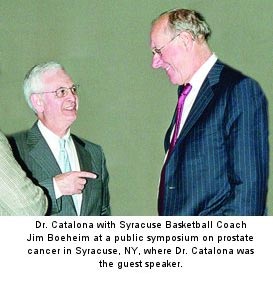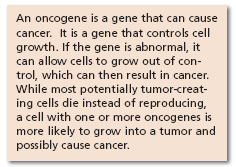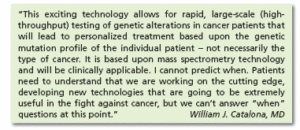Breakthrough In Bringing Personalized Medicine Into Clinical Practice
(This article is a summary prepared by Cecilia Lacks, PhD, for Quest readers of a Journal Article published in Nature Genetics, 2007, High-throughput Oncogene Mutation Profiling in Human Cancer. Its research and findings are a collaboration of over 50 researchers and their institutions. Dr. William J. Catalona is one of the participating researchers and the source for critical tissue samples used for testing and standardizing this exciting new technology for identifying genes that are commonly altered in patients with a variety of different common types of cancer.)
In theory, personalized medicine the ability to target with drugs the specific disease process of a particular person is a terrific idea.![]()
It guides doctors to use the right drugs for the right purpose and avoids the use of powerful medications that can cause harmful side effects and not fight the disease as thought.
In practice, personalized medicine has some practical applications for a number of cancers: breast, lung, leukemia, gastrointestinal stromal tumors are examples. But prostate cancer is not in the group, although researchers are getting closer.
For cancers, the issue is critical because the required drugs are extraordinarily powerful and expensive a single Avastin infusion costs  upwards of $75,000 and the disease process is complex.
upwards of $75,000 and the disease process is complex.
However, researchers are finding ways of mapping diseases using genetic profiling to trace how multiple mutations are causing specific cancers.
Then, they can apply this information to testing drugs for effective suppression or prevention of specific cancers.
This latest paper in Nature Genetics brings such technology much closer.
Our paper in Nature Genetics introduces a new technology for screening all kinds of human cancer for 17 commonly-occurring oncogene mutations that can be targeted with newly-discovered drugs, such as Gleevec, Avastin, and Herceptin. Thus, it brings us to a technology that can be applied to personalized medicine, Dr. Catalona explained.
For instance, he said, If DNA extracted from a person’s tumor could be quickly and easily screened for all 17 mutations simultaneously,  and the results showed, for example, that his tumor would be resistant to Gleevec, but responsive to Avastin and Herceptin, then a personalized treatment regimen could be tailored to his case, rather than using the same drugs in all patients with his type of tumor, as is the current practice.
and the results showed, for example, that his tumor would be resistant to Gleevec, but responsive to Avastin and Herceptin, then a personalized treatment regimen could be tailored to his case, rather than using the same drugs in all patients with his type of tumor, as is the current practice.
Cancer Mutations
Oncogene mutation profiling, finding the genes that allow tumor cells to live and to reproduce, is a central focus of cancer research.
One of the findings upon which this paper is based shows that mutations created by cancer causing genes (oncogenes) are not random. In fact, in the majority of known oncogenes to date, a relatively small number of genes account for a preponderance of changes.
Using this information, a collaborative group of more than 50 scientists designed 245 genotyping tests that looked at 238 mutations involving 17 human oncogenes. Looking at multiple specimens and conducting multiple tests at one time is called high-throughput genotyping.
Their goal was to detect critical and/or targetable cancer mutations on a large scale in clinical specimens. This detection has often proved difficult.
Using the technology of mass spectrometry, they made some significant finds.
They identified numerous individual and co-occurring genetic alterations that promise to provide new biological and therapeutic insights in several tumor types.
They found and identified previously unrecognized oncogene mutations in several tumor types and an unexpected high number of co-occurring mutations.
These results offer a new dimension in tumor genetics. Mutations involving multiple cancer genes can be studied simultaneously and studied in particular patients precisely at treatment time to guide cancer classification and to recommend reasonable therapeutic interventions.
In addition, the clinical application of rapid, readable and cost-effective mutation profiling should help the development of targeted cancer therapies.
Sharing Expertise
This study is a good example of how collaborative research, from a large group of investigators and a large number of prestigious  institutions, from around the world, can lead to important discoveries, Dr. Catalona said.
institutions, from around the world, can lead to important discoveries, Dr. Catalona said.
An important component to his participation in the study involved providing frozen prostate cancer tumor samples from 95 prostate cancer patients with whom he had conducted long-term follow-up.
These highly reliable samples became the standard by which other cancer specimens were measured and compared. They also established the ranges for determining positive or negative results from other cancer samples.
Another important contribution from Dr. Catalona is his knowledge about the fields of cancer genetics and cancer biology knowing what the best new ideas and strategies are and who the best researchers are.
Then, his role is to establish working collaborations with them to conduct the most important and promising research projects he believes are most likely to benefit patients.
Unlike the basic scientists, through his large prostate cancer practice, he has almost unparalleled access to prostate cancer patients and can collect precious clinical samples.
His research team (funded largely by the URF) carefully annotates the samples by collecting medical and family history, pathology results, treatment information, and serial, long-term follow up to determine treatment outcomes. Without this piece, nothing could be accomplished.
His team also receives the genotype results and correlates them with clinical parameters.
For instance, they are now performing a statistical analysis of how the deCODE genotypes correlate with prostate cancer aggressiveness and treatment outcomes and whether the deCODE genotypes cluster in families.
“This kind of research shows how important cancer specimen samples and genetic studies are and how quickly new discoveries can benefit patients, Dr. Catalona said.







